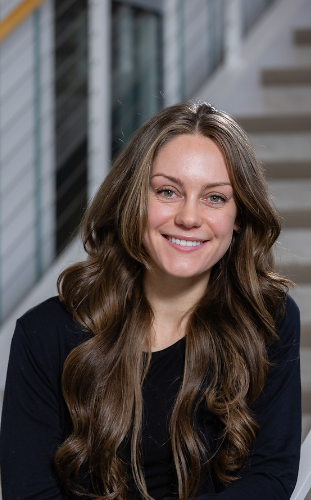Doctor of Nursing Practice (DNP) to Doctor of Philosophy in Nursing (PhD)
Need your questions answered?
Overview
From implementation to discovery
Advance your DNP project’s research from clinical implementation to scientific discovery with a PhD in Nursing from Johns Hopkins, and get credit for the work you’ve already done. This program will provide you with the knowledge and skills in theoretical, methodological, and analytical approaches that will enable you to conduct research to discover and apply knowledge in nursing science and health care. Most full-time Johns Hopkins Nursing PhD students receive 100% tuition funding and guaranteed compensation for the first four years of study.
The Johns Hopkins School of Nursing specializes in eight Areas of Expertise. With access to world-renowned nursing faculty in these specialties, cutting-edge facilities, and opportunities for interdisciplinary collaboration with noted researchers throughout Johns Hopkins University, you’ll build the skills to develop and implement a scientific research program and launch your career. By graduation, most Hopkins nurse scholars have been awarded grants that continue their research and set them well on their way to a successful career.
Program Details
Tuition & Fees
Most full-time Johns Hopkins Nursing PhD students receive 100% tuition funding and guaranteed compensation for the first four years of study.
Estimated Tuition Cost: $2,430 per credit See Cost of Attendance Details
Financial Aid: There are numerous options for financing your education including grants, scholarships, and federal loans. Learn more.
Upcoming Application Deadlines
Fall entry: November 15
Requirements
Admission Criteria
Graduate of an accredited Doctor of Nursing Practice program
A written statement of research goals including reason for interest in Johns Hopkins
Research interests that match faculty expertise and School resources
GRE scores are accepted but not required
A minimum scholastic GPA of 3.0 on a 4.0 scale
Interview with faculty (if moved forward by admissions committee)
Writing sample (publication or graded paper)
Resume or curriculum vitae
Three letters of recommendation (two academic, one professional)*
Copy of official RN license(s) (if applicable. Applicants holding a degree in a non-nursing related discipline will be considered on an individual basis)
Official Transcripts (from all previous colleges/universities)
Prerequisites
No prerequisite courses.
*References should be recent, written for the purpose of your application to this program and from professors who know you as a student or employers who know you as a professional in a job setting preferably in a supervisory role. Personal references from colleagues, friends, or family members do not meet the requirement. For PhD applicants, it is strongly preferred that a least one of your recommenders holds a PhD.
“Prior to becoming a nurse, I worked as an EMT, and working out of an ambulance, I was able to visit patients’ homes and see how people who had dementia lived. I wanted to be a provider to care for people with dementia and Alzheimer’s as well as work toward new treatments and interventions. It takes 17 years to get research into practice. The DNP/PhD is training me to become an adult-gerontological nurse practitioner and a researcher—I can get evidence-based care to my patients sooner. ” Inga Antonsdottir
Inga Antonsdottir
#1
No. 1 in the nation for its Doctor of Nursing Practice Program (DNP)
#2
No. 2 in the nation for its Nursing Master’s Program (MSN)
#3
No. 3 nursing school in the world, according to 2024 QS World University rankings
Curriculum
Each student completes a core curriculum and works closely with faculty advisors to complete an individualized course of study that fulfills the student’s goals and develops the basis for a program of research.
Full Curriculum
Philosophical Perspectives in Health
Scientific Perspectives in Nursing
Quantitative Research Design and Methods
Qualitative Research Design and Methods
Mixed Methods Research Design
Grant Writing Seminar
Measurement in Health Care Research
Responsibilities and Activities of the Nurse Scientist
Statistical Methods in Public Health I
Statistical Methods in Public Health II
Statistical Methods in Public Health III
Theory and Concepts of Health Behavior
Symptom Evaluation and Management
Special Topics in Violence Research
Advanced Nursing Health Policy
Stress and Stress Response
The Evolving Roles of the Nurse Educator (online)
Statistical Methods in Public Health IV
Writing for Publication (online)
Advanced Seminar in Translational Research
International Health Systems and Research 3
Current Issues and Trends in Cardiovascular Health Promotion Research
Critical Applications of Advanced Statistical Models
Technology and eTools to Conduct, Facilitate, Implement and Manage Research (online)
- Scholarly Research Portfolio for PhD Students
Dissertation Seminar
Dissertation
Sample Course of Study
Philosophical Perspectives in Health
Quantitative Research Design and Methods
Statistical Methods in Public Health I & II
Research Residency – 15 hours per week
Scientific Perspectives in Nursing
Qualitative Research Design and Methods
Mixed Methods Research Design
Measurement in Health Care Research
Statistical Methods in Public Health III
Research Residency – 15 hours per week
Grant Writing Seminar
Comprehensive Examination
Dissertation Seminar*
Dissertation*
Electives (10 credits)
Research Residency – 20 hours per week
Teaching Residency – 10 hours per week
Dissertation Seminar*
Dissertation*
Activities and Responsibilities of the Nurse Scientist
Electives (9 credits)
Research Residency – 20 hours per week
Preparation for Doctor of Philosophy Board Examination
Research Residency – 20 hours per week
- Scholarly Research Portfolio for PhD Students
Dissertation Seminar*
Dissertation*
*PhD students having successfully completed the written Comprehensive Examination must be registered for at least three credits consisting of two credits dissertation advisement plus one credit dissertation seminar each semester they are progressing toward the degree.
*Part-time students who have completed the Comprehensive Examination must register for two credits dissertation advisement plus one credit dissertation seminar each semester they are progressing toward the degree after completing half (10) the required elective credits.
*Up to 9 credits may be applied from your DNP program.
**Per Doctor of Philosophy Board policy, students must either be registered during fall and spring semesters, or be on an approved leave of absence.
***Transfer of credit is granted on an individual basis. Please see the transfer of credit policy and **complete the form to make a request.
“In the group mentorship model, you are consistently receiving feedback from your faculty advisors but also other students. You aren’t working alone. I think that is what helped me the most.” Samuel Byringiro, PhD, postdoctoral fellow
Samuel Byringiro, PhD, postdoctoral fellow
Engage with Us
Join us soon for a tour, on-campus event or a virtual visit.
Request Information
Speak with Admissions to learn more about our programs.
Virtual Info Sessions
See recordings of some of our recent virtual info sessons.
Tuition & Other Costs
Financial aid
View the costs for the PhD Program.
2024-2025
Scholarships & Grants: Grants are awards based on financial need that do not have to be repaid. Many students also benefit from scholarships and awards based on merit. Learn more.
Loans: Many students will avail themselves of loans to help finance their School of Nursing education. If necessary, we encourage you to borrow only what is absolutely essential to cover your educational costs. Learn more.
Frequently Asked Questions
The research area in an admission application should be well-defined but not overly rigid. Candidates should demonstrate a clear focus within their field of interest, outlining specific research questions or problems they aim to address. The proposal should show a solid understanding of current literature and gaps in knowledge, indicating how their research could contribute to the field. While applicants may have a general idea of their methodology and potential outcomes, there should be room for refinement and adaptation as they progress in their studies. The research area should align with the program’s strengths and faculty expertise. Overall, the essay should reflect the applicant’s understanding of the issue, and critical thinking skills, and potential for conducting meaningful research, while still allowing for guidance and development throughout the program.
Although contacting a faculty member in your research area is not required, it is an opportunity to become familiar with researchers in your area of interest and to ask questions not addressed on the school’s website. While it can be helpful to have a direct match, students often have great success in the program when a piece of the research overlaps with the advisor. If there is a particular faculty member whose work interests you, you may discuss this as part of your application essay. The best place to start is with the PhD Assistant Director of Recruitment, Laura Panozzo at [email protected] and with a review of our most recent PhD virtual information session at https://nursing.jhu.edu/admissions/index.html.
Once you are admitted to the PhD program and decide to matriculate, the PhD Admissions Committee determines who will be your advisor(s). Generally, one advisor is selected, but in some instances-depending on your research area-two advisors are assigned, one of them serving as the primary advisor and the second serving as a co-advisor. One of the faculty would be your primary advisor and the second would serve as a co-advisor. We try to match students with faculty members who have similar research interests.
The PhD program prepares the nurse scholar to develop and conduct scientific research that advances the theoretical foundation of nursing practice and healthcare delivery. The program is designed to prepare nurses for careers as research scientists, often in academic or governmental positions.
The DNP program prepares nurse leaders for evidence-based practice in both direct patient care and executive roles. View Comparison Chart
View information about a unique opportunity to earn a dual-degree DNP/PhD.
The time needed to complete the program varies, depending on how fast you progress. Some students in our program finish their degree in three years, others take four years or longer.
Students whose native language is not English are required to take the Test of English as a Foreign Language (TOEFL). Johns Hopkins School of Nursing requires a minimum TOEFL-IBT score of 100 to be eligible for admission. More
The PhD program has a Biostatistics heavy curriculum so previous coursework in Biostatistics is helpful. We encourage students that have not had previous coursework in this area, or have not taken the coursework in the past five years, to look for ways to strengthen that knowledge base before matriculating into the program. Please reach out to Laura Panozzo, Assistant Director of Recruitment, at [email protected] for a list of resources to help you prepare while applying and before matriculating into the program.
GRE scores are accepted but not required.
The PhD program is a full time, onsite program only.
Students should expect to spend 15 hours a week on campus on their funded research residency in collaboration with their faculty advisor for all three years that they receive full funding. Students should expect to spend an additional 15-20 hours per week on coursework.
Coursework completed outside the United States must be evaluated and translated into US equivalencies. Official transcript evaluations must be submitted as part of the application process, and applications will not be considered complete until all evaluations for any work completed outside the United States are received. The Johns Hopkins School of Nursing recommends WES-ICAP.